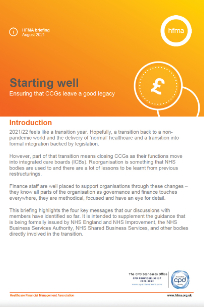Technical / Technical review - September 2021
Northern Ireland’s comptroller and auditor general has highlighted a disagreement with the local Department of Health over the accounting treatment of £135m of spending in the Department’s 2020/21 annual report and accounts. In his report on the accounts, Kieran Donnelly said he was concerned about the treatment of spending as accruals rather than provisions in three spending areas – the £500 staff recognition payment, a holiday pay accrual and clinical excellence awards liabilities over the last four years, which remain unpaid. Under International Accounting Standards and budgetary guidance from the Department of Finance (DoF), he argued all three payments should have been treated as provisions. He added: ‘The Department contends that this does not represent an attempt to circumvent DoF budgetary guidance in order to retain funds and I have no evidence that this is the case. Nevertheless, the effect is to retain a significant amount of funding, more than £135m, within the [health and social care] sector that would otherwise have been redistributed within the Northern Ireland funding bloc or returned to the Treasury.’ Mr Donnelly added that he expected to see a payment of these retained funds by 31 March 2022.
NHS England and NHS Improvement have issued guidance on corporate governance and financial management standards for independent sector providers of NHS services. The document brings together best practice to help providers of commissioner-requested services adopt and apply the standards of financial management and corporate governance standards required by their licence conditions. The guidance covers a number of themes including: appropriate governance structures; decision-making and the use of an appropriate assurance framework; the role of the audit committee; reporting and oversight of financial information; and the management of complex contracting forms.
Designate chief executives of new integrated care boards must be identified by the end of November, according to interim guidance on the functions and governance of integrated care boards, published by NHS England and NHS Improvement. Designate finance directors, together with medical and nursing directors and other executive roles, should be identified before the end of the fourth quarter of the year. The guidance sets out minimum membership requirements for ICB unitary boards, including: a chair and at least two independent non-executives, the four executive roles covering the chief executive and finance, medical and nursing directors; and a minimum of three partner members, typically including an NHS provider chief executive, a representative from primary medical services provider, and a local authority chief executive. The guidance also covers ICB committees, providers and provider collaboratives, place-based partnerships and the management of conflicts of interest.
 A new briefing from the HFMA highlights four key messages to help finance staff support their organisations in the transition to new integrated care boards (ICBs): start now; work together; ensure good housekeeping; and communicate constantly. Multiple clinical commissioning groups will be merged into single integrated care boards on 1 April next year and, in a few complex cases, existing CCGs will be split across more than one ICB. However Starting well: ensuring that CCGs leave a good legacy warns that, while CCGs will be the most affected by the changes, all organisations will feel an impact. This makes it vital for all affected bodies to work together to the same time frames. The briefing provides a list of the key requirements for finance staff ahead of the reorganisation. These include: understanding all balances on the statement of financial position; resolving disputes where possible and documenting any unresolved issues; deciding who will pay unpaid invoices at the end of the year; and agreeing all balances between bodies joining the ICB.
A new briefing from the HFMA highlights four key messages to help finance staff support their organisations in the transition to new integrated care boards (ICBs): start now; work together; ensure good housekeeping; and communicate constantly. Multiple clinical commissioning groups will be merged into single integrated care boards on 1 April next year and, in a few complex cases, existing CCGs will be split across more than one ICB. However Starting well: ensuring that CCGs leave a good legacy warns that, while CCGs will be the most affected by the changes, all organisations will feel an impact. This makes it vital for all affected bodies to work together to the same time frames. The briefing provides a list of the key requirements for finance staff ahead of the reorganisation. These include: understanding all balances on the statement of financial position; resolving disputes where possible and documenting any unresolved issues; deciding who will pay unpaid invoices at the end of the year; and agreeing all balances between bodies joining the ICB.
NHS England and NHS Improvement have provided responded to requests for further clarity on the treatment of local authority funded services in the national cost collection (NCC). Typical services include health visitors, school nurses and sexual health services and current guidance states that these should be excluded from the National Cost Collection. The national costing bodies have now said that, for 2021, organisations should continue with the local process used for 2019/20 NCC. If organisations included the local authority funded services in 2020 then they should do so again in 2021. They should exclude them if that is how they treated them in 2020. The inclusion of local authority services is being reviewed for 2022. Further queries should be sent to [email protected] with the subject header ‘FAO FB – LA services’.
Related content
This webinar series offers colleagues of ICS organisations the opportunity to discuss common priorities, challenges, and successes within their field.
We are excited to bring you a fun packed Eastern Branch Conference in 2025 over three days.